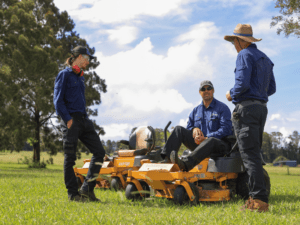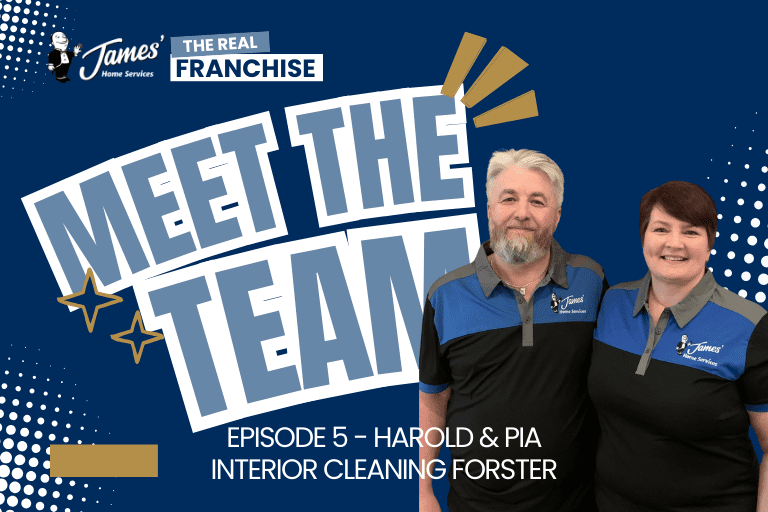Justin – Well, hello. My name is Justin Kelly. I am, one of the owners of James Home Services, and I’ve also been a franchisee with James, myself. we’ve joined James, my wife and I, in February 2010. but the purpose of, what we’re doing today is we’re starting to just introduce some of our team around the country, just have some down to earth normal chats with people to see how they going.
So you can hear their stories and get to know them. and just see that the success that can come through, having your own business. So without me saying too much, I’d love to introduce an amazing couple from that are currently in Forster, New South Wales on a beautiful what is it? Central, North coast, middle North coast. Well I’ll let you got both.
Introduce yourself. So who have we got with us today?
Pia – I’m Pia and my husband Harold. We joined the business, in November last year. So 2003. Get it right.
Yes. Thank you.
I was made redundant, and was looking for something different to do. how had been in retail for 20 odd years? and had gotten tired of, hearing the same story revolve around and, we started looking at different opportunities and gems as one of them. And nine months later, here we are.
Justin – Awesome. And where were you? Where we were, right. Where were you in Australia when we when you first started thinking you needed to track?
Pia – We were both in Sydney, and, Sydney was never where we wanted to end up. It’s just that three was. There were opportunities there, and I took them. And how it followed. yeah. And so when that was done, yeah. The opportunity to get out of Sydney is, is another reason why we started looking at our business.
Justin – Yep. Correct. So what took you to Forster?
Harold – I’m originally born and raised in Forster. as a local boy. and I still have family here as well, so family’s getting a little bit, older. so the opportunity to come back and also just the lifestyle itself with the beaches, the ocean, it’s a real tourist make up, on the mid-north coast. so at Christmas time, it gets quite hectic with tourists and stuff that come through.
So, so it’s just that sort of lifestyle itself. it’s a laid back, more so the more of these and that hustle and bustle of the, Sydney side of it all through.
Pia – And taking 15 minutes to travel, you know, 30km is great as opposed to traveling 15km and 45 minutes as most Sydneysiders would be aware of.
Justin – I was just going to ask you, are you missing the commute to work every morning?
Pia – Not okay. And there’s a word in between that. Yeah, yeah, yeah.
Justin – So what, I guess what led you to have a look or even consider having your own business? Because, I mean, both of you have had sort of corporate jobs for a long time. What? Planted the seed?
Harold – It more so something that we’ve got more control skills with. so we can actually take the business sort of itself. So yeah, there’s a lot of ground rules that you still need to follow through, but the day to day running of that is pretty much up to you. So the decisions you make, you’re the end, person at that point that might set one throws at you some good ones, you make some bad ones, you learn from it and move on.
Yeah. it’s not a case of where you’ve got someone in corporate saying that this is the one that you need, that we need to sort of tie through, right, wrong or indifferent.
Pia – So yeah, that and it allowed us to be where we wanted to be. but being your own boss, you can move away from the, you know, central Sydney side of things or, you know, but even when we were in Melbourne, I could have looked at going to to country Victoria. as an option. Running your own business means that where you want to live and work is up to you.
Justin – Yeah, absolutely. Yeah. So how have you found working together?
Pia – It’s been a challenge.
Harold – Because when we were in retail together, we vowed we’d never, ever work together. in, side by side. But it’s different this way because we both equals. Where before it was, I was more the boss. Where Pia was the sort of worker to just the hierarchy of the situation of that we was looking at. But now where we are equals through.
Harold – Yes. We still don’t, agree on everything 100%. but we as long as we pushing it to our own goal, it works a lot better through that way. And our communication style has changed multiple times. to be able to talk to each other where it’s not a case of where you’re trying to talk down to will talking heads of directing someone, it’s also advice through at the same point.
Harold – So it’s sort of been a big learning curve for me, but more so, I think, of being able to have someone that is an equal more so than just,
Employee themselves. Yes.
Pia – And it also allows us to play to our strengths. Yes. So that’s and that sort of we already knew that going into this. but I’ve got more of the admin skill. and Harold is more of the people person. Hey. Yeah, relationship building type thing. and that’s just because of our history. Yeah. Being able to use that in our own business instead of. Yeah, got us to to where we are, which is looking really healthy. Surprisingly good.
Justin – Good. Yeah. Because it’s, I guess in my role, as you know, I walk through the journey with everyone looking at James. and I remember when we went through, we had some very rigorous discussions, didn’t we?
Pia – Which we did. I had some major concerns about being locked into a framework that I didn’t necessarily agree with because I couldn’t see it. And you quite politely and kindly said, give it a chance and you’ll see why is the way it is. Yeah. And that very much, I think it was three months. Yeah. I kind of swung around you and, and the very first opportunity I got kind of like.
Yes, you were right. I am biting my tongue and I’m admitting defeat. That the conversation needed to be held, but it was, it was, definitely got a good decision we made to to take on the James interior cleaning franchise and following the framework that’s there. Yeah. Works really well.
Justin – Yeah. And it’s good because it’s it’s the part of the job is, you know, it’s totally transparent. And so that you get to find out all these sorts of things or anything that might concern, and I guess like from, like one of the concerns, like you said, you just mentioned, is about having that framework and, and with all the businesses that we’ve started, particularly in the last 12 months under a new subscription, that’s just caused things to explode.
We’ve just learned so much about starting a new business, and I love your story because how long were you actually in Forster before you started your business?
Pia – Not even two weeks.
Justin – Not even two weeks. So you just brand new move there to a new area where essentially, yes. Harold you were born there, but not really connected in the town anymore, like you were. Yeah.
Harold – We we’d already been out of the area for 15 years. yeah. Are you sort of coming back inside? Yes. You to some people, you still are still here that you knew from 15 years ago that there’s still a lot of new people in you. And I just sort of starting again with. So.
Justin – So you came in brand new to the area, starting a brand new business in an industry you’d never really worked in before. Do it first time in your own business together.
So take on a framework. So. Yes. How are you feeling? That’s exactly where I’m going. How are you feeling here?
Pia – Back then, I was extremely nervous. yeah. You know, it is. It was literally, you know, It was literally, you know, working for yourself. So you only make the money that you, when you working for an employee, employer, you get your paycheck every week. yeah. So I was very nervous about that. but obviously, you know, having that safety net of the income guarantee was great to know.
It was there, even better not needing to use it, yeah.
Justin – Well, why didn’t you need to use it? What happened.
Pia – Because the marketing development that James has, put us on our front foot. So we had already gotten potential leads for when we moved here. So obviously when you move to an area, you there’s a bit of pre-work that gets done in one of those ones because we knew we’d be going to. James. I was talking to a couple of real estate’s about what sort of need do you guys have for professional cleaners?
And when one of the agencies almost jumped the counter to hug us saying, please come on board, we kind of knew that that was something that we could do. but when we moved to the area, we got in contact with them straightaway saying, we’re here. and that very same week, we got work with them.
So it was hard work. End of lease, vacate cleans, not easy, but the money is definitely there for them. Yeah. You put the hard work in and you get paid for it. yeah. And that helped us launch to where we’ve now got almost 25 regulars. no, not in And we still get the the real estate’s asking us quite regularly to do jobs for them.
Justin – Yeah. You were just sharing about a job you had to do today. Would you mind touching on that sort of job? Nothing. Haha. On the sound of it.
Pia – Well, yeah. Well, no, it’s all yours. You went and saw sort we had like.
Harold – That we do a lot of work with gave us a call and then say, can you come and look at this property with us. and they really wanted us to do the clean because it was the place was in such of, bad state, that they wanted to make sure that was done properly the first time. Because thye’ve had nothing but issues trying to get work done. and, and having people call back and just extend the, the whole process itself. So, we stopped in, had had a look, it was a real horror story. but we price the job accordingly at the same time, that were more than happy with the price that we gave them because they knew our quality of work at the same time.
So they knew that the money they were going to give out, the job was get is going to be completed. Well, and they don’t have to sort of worry about it at that point. Certainly. and that’s the rapport you build with, real estates, even with your original clients, is that you make sure that you deliver that gold standard.
Yeah. And that you’ll they know then that if the first one that comes to mind, if they want to clean up is giant, yeah. You will get a lot of referral work from when tenants go to the real estate and said, I’m moving out. Who do you recommend as a cleaner? I give our name out because I know then that the work’s going to get done.and I don’t have any issues. Then with the final inspections and bonds going back and all of those bits in place. So we really build our namesake, on, on delivering that gold, that gold standard.
Pia – Good. Fantastic. Well, that was one that we had this week. this is moving out. They’ve seen, because they’re in a unit complex. They’ve seen other people moving out, and I’ve seen agents coming back and lots of people coming in and out at the end of it. and they didn’t want any that they just want to be able to leave.
So this is the real estate really recommend. And yeah, we said that quite often this afternoon. So. All right.
Justin – So back to how, the journey started. Where did you first see James? What made you enjoy?
Harold – I saw it on Facebook. yeah. It was a ad that was running through, and when all else I did a, internet search, on different franchises, because I did have a look at a few other ones, like, ha ha, those are the ones as well. again, gyms. I looked originally at mowing and I thought, nah, I’m a little bit old and I don’t like the hot weather to be able to be out in the weather, mowing lawns in the middle of summer. But we had a look there and then make contact with yourself. with any sent through a bit of information. that was also at that stage there was, the news report that was still going through Facebook when I was doing the subscription model.
Yes. So I’ve that sort of got us more intrigued at the same point, because it was a lot safer aspect for us to get in with doing the subscription service instead of having to put all the money upfront first.
Justin – Yeah, it makes such a difference, doesn’t it, for people not having that massive outlay in the beginning and that extra financial pressure, putting yourself under.
Harold – Yeah. Exactly. Yeah. And plus so.
Pia – When you, when.
Justin – So we met went through the journey through that journey got to meet other people who would already join so you could talk to them. Then you got sent the agreement and you had a couple of weeks to go through that and had a lot of questions raised to the agreement. Then we here.
Pia – we we had a lot of questions the whole way through. yeah. Like my very first time around, I think, we kept everyone up with the fact that I think I’d like to thank questions and I have, I think ten of them.
Justin – That’s right. I remember it was about twice as long as any zoom around it ever done. It’s, yes, we there was a lot of it, which is excellent because to me it shows you really think about it. I get concerned when people go, great, it’s a business. It’s only $1,000 up front. I mean, you know, there’s a lot more to that decision.That people need to go through and understand. So then it got to approaching the study of business. What happened, where did the gear head and all that sort of stuff arrive? what did you get?
Pia – Yeah. So we were introduced to our business coach. and, and strangely enough, was actually from Forster.
Yeah. So one of those sort of coincidences in life. yeah. and we got a list of things that we needed to go through, to sort of help us set the business up correctly. things like making sure that we got the business name registered, that we got, the correct insurances, that, we set ourselves up for the GST component of it.
And then we got our equipment list, which came directly to us. we were off training. All our deliveries were being made to the house. So thank goodness we had good neighbours. and then obviously we had to pick some of it ourselves from from places like Bunnings and, you know, things pretty much getting to think of Officeworks as kind of a line.
Justin – Sign writer came to your house to, to to.
Pia – Yeah. So, signwriting was they came to us thankfully, because, it wasn’t going to be a bit difficult otherwise. Yeah, yeah. Trying to move for 350km.
Justin – So the training’s in two parts of the initial training. Yes. So tell me about the first part. What happens there.
Pia – So the first part is how to run the business. it’s all about introducing you to the, Butler system, which is of course, the client relationship, program, which is an absolute godsend. Oh, I don’t know that the business would run as smoothly without it, so that’s definitely it. spending a bit of time on marketing and how best to utilize your strengths to to get that done.
Harold always tells a story to anyone that it brings. It asks in about the business, about going out and delivering pamphlets on bin day. yes. To, to get that knock and drop. conversation happening. Yes. So that’s sort of really helped us along. and then the next part is actually about how to use your products.
These are chemicals and how to get the job done efficiently while, you know, still creating that relationship with your customers. Yeah.
So things like, have you ever used a backpack vacuum cleaner before? I don’t think anyone has. So let you do the cleaning. Yeah.
Justin -So odd question for you how did feel resigning.
Pia – It was. Very scary.
Harold – Because I’d been in retail ever since I left school, I’d always been employed. I mean, I was sort of unemployed at that point in time. so as much as starting your own business, you’ve got employment, but it’s what you might have been saying. So I was saying before, it’s not a case where you’ve got a constant paycheck coming in every week.
It was, aa sense of relief as well, that I was getting away from the trials and tribulations that I wasn’t happy with, but also excited about the new journey that was going to stop sign point, that we had more control over it. We were the leader of our own destiny at that point.
Pia – Yeah, yeah. And I think that’s the thing. Thing was, am I looking at my husband coming home from work, as an employee, that the weight of, you know, trying to satisfy the bosses and working alongside a team that may or may not appreciate you was then having to deal with the customers and that side of it, knowing you can do things differently, but, you know, led to, to running your own business.
That gives him the opportunity to fix up anything that he doesn’t see being done correctly or could be done better. if there is a relationship issue playing a different tact, as you know, we were speaking earlier, one of the things is what we had a real estate agent that we wasn’t giving us any work, which was really strange.
They’ve given us a lot of work, and then all of a sudden it dropped off. so we went and reconnected with them, and all of a sudden the work’s picked up again within, we’ve got. Yeah, yeah, we we kind of, you know, didn’t have a little work and the number wasn’t there. And now with the those people that call again.
Justin – Really is relationship where people business aren’t we. Yeah. We’re about working with people.
Harold – Yeah. And that’s the case. Part of the training that we had was that communication with your, potential client is to be, on the front foot. So if you get a lead that comes through, contact them straight away. Don’t leave it one, two, three, four hours because it’s you forget something, you don’t get back to them. and that’s the one thing we found when we first moved that we were looking for trades ourselves to do that around the house, and we couldn’t get hold of people.
We were ringing numbers and no one was answering leaving messages. No one was getting back. and that’s probably the biggest thing with found is that when we do get a lead come through, we contact within a couple of minutes of the lead. It comes through to the phone and the customer on the other end on that. That was quick.
I just put that call in. Oh, they said it would be a couple of hours before I hear back from someone. Yeah. When what that’s what we’re finding is we’ve that initial contact, we get on that front foot and we get the job 99% of the time because we are on that front foot.
Pia – Yep, yep. And we’re still doing that today. you know, not nine months in and people are still going, well, you guys are responding as I responsive. yeah. The back so quickly, even with the quoting like, every single one. Like everyone knows, if you ring us up, we are going out to visit you on the site so we can walk the property with you to find out exactly what it is you want us to do.
Everyone is really impressed that we don’t make that appointment two weeks down the track. We make that appointment within days. Yeah.
Justin – Actually, a question I always get asked. how do you handle this? Like it’s so many people, when they do put in an inquiry, just say, oh, just tell me. Right. How do you handle that?
Harold – For the biggest thing that I’ve found with that is asking more questions. First, asking what style of service they’re after. Is it a weekly, is it fortnightly? Is it a monthly or is it just a one off? How big the premises is? so I get more detail of what the, what they require. But then also explaining to them is that sight unseen, it’s very hard for us to be able to give them a price
We don’t know the state of what your shower screen is like, whether you want an oven to be cleaned at the same time. So yeah, it could be, charred black inside and it’s going to take a couple of days to clean it. Or it could be it’s immaculate or it’ll just be a quick wipe out through it’s explain to them.
It’s that attention to detail that we give, when we do the quote. And we also work with them and they tell us what they want to have point at the same point, because what we would say would be, you know, you know, basically they might want that done. So we tailor the quote to suit their actual needs the same point.
And that tends to sort of twist them around that little bit more and say, you still get the old one that says, oh, how much did your hourly rate and all they’re interested in is an hourly rate, because you’re probably trying 3 or 4 different cleaners to try to get the the cheapest hourly rate through. but then explaining it is a fixed price.
It is a satisfaction guarantee giving them all the benefits of that same point. Yes. Seems to turn them around.
Pia – Yeah, yeah. And I probably have a slightly different way that I kind of explain to them that if you’re paying somebody by the hour, they’re not as likely to work as quickly. Yeah, exactly as they need to, or they’re only going to give you exactly that amount of time so easily 2.5 hour job. But they’ve only quoted two hours work.
Then that’s the job. Yeah. We’re going to be your fixed price quote. You’re going to know exactly what we’re going to do, and we’re going to deliver that, even if it takes us longer than we originally thought. Yeah, yeah.
Justin – That’s right. Yeah. I just have the same thing in my own cleaning franchise. And and then people would estimate, oh, I know it’s going to take four hours to do this job. And it’s like, well, hell, do you not going to like based on that. But how do you know you’ve never run a commercial cleaning business? You know, we got great chemicals and we’re trained in this stuff, and we have even cleaning a bathroom.
You know, as you guys know, there’s a step by step process to get it done to go metal standard, but extremely quickly. And yeah, so those sort of things that makes the early writing relevant will give you an exact price. So the what your plan. Oh well another question for you.
For each of you what’s been the hardest thing in the nine months for you in having your own business doing this?
Harold – For me would be backing myself to know that if I follow the system that it is going to work, where you start to get a little bit overconfident and then you go, oh, I don’t need to do this. I’ll do it my way. Yeah. The sudden it gets a little bit quieter. Then you start going back to the marketing.
How you supposed to do that through Facebook? all of that at the same point. your knock and drops your contact in your real estate’s designated places. If you do, you will be you go back to those basics, then the work itself naturally flows back through. So it’s taking that cockiness out of it. I suppose that I know how to wrap it up.
Yeah, the system works. We found that where we did the job today. We’re on a main road, so the car itself, that sign written is out sitting prime position on the on the main road, there was a carpark, at the back of the building that we could have parked in, but we went. No, it’s not. So we can kind of see the car, and let it be, that advertising bonus for us where we don’t have to get a little bit more of a pain to sort of walk back and forth to the car to unload..
But the marketing side of it, which is priceless prime position.
Pia – Yeah, but yesterday was a perfect example. We parked on the street instead of in the driveway, a guy across the road, come across and say, hey, have you got a card? I might have some work for you.
Justin – Yeah, yeah, yeah, that’s how that works, isn’t it? Yeah. So for yourself Pia, what have you found the hardest?
Pia – the physicality of it. Yes. Yeah. Oh, I, I’ve had a misspent youth and I have really bad knees. so, you know, having to adjust the bodywork, around how to get those little nooks and crannies done. so obviously not sacrificing the level of service just how I do it. It’s really been the hardest thing for myself, you know, that.
And working with this guy.
Yeah. There is. You know, once upon a time I. I’d spend maybe 12 hours a week with him, other than when my both unconscious, and now I’m spending, you know, 38, 40 hours a week with him which, is a little bit different. But, you know, it’s been, Nice
Justin – For my wife and I when we started working together, it was just trying to work out who’s responsible for what. So we each had our own areas, and then we didn’t. We didn’t rub each other up the wrong way so often.
Well, we talked about the hardest thing. What’s been the funniest thing? What’s been the thing for you that’s been the most enjoyable?
You got to tell me about Christmas, Harold. You got to.
Harold – With so many years in retail itself and being having to work weekends, public holidays, Christmas Day, all these sort of bits and pieces and being able to have those days themselves off. So I know now that I don’t we don’t have to work weekends if we don’t want to. We only working at is it fits into what we want to do at the same point in time.
Public holidays, and Christmas last year was the first Christmas that I’d had off in, 15 years. that I wasn’t on call for going in to look at fridge alarms and those bits and pieces so I could crack a beer at 10:00 in the morning and got, hey, let’s enjoy Christmas. and having that sort of break away from, being an employee at the same point.
Justin – And for yourself, Pia?
Pia – Surprisingly, it’s it is doing the cleaning. you have to see that every day I can go to someone’s house and make a difference. That helps them. Yeah. One of the ones that we do, they’re starting to make some changes. They’ve been in the house for five years, and they’ve spent so much time cleaning it. as well as working full time.
But they haven’t been able to do the things that they wanted to do on the property. since we’ve been working that gone, it just made so many plans to, to do this with a property that we never thought we’d get to because we’re doing the cleaning. Yeah. yeah. It’s really that sort of knowing that what I do makes an impact on other people in a positive way.
Which is really something that you can see each and every time.
Justin – Yeah. Okay. Well, here’s a real tough question for you. Take a lot of honesty here. So have you ever been days where you felt like just giving up?
Harold – No, I haven’t.
Pia – I won’t say not entirely. there have been some really hard physical days where we’ve done exit clean after exit clean, after exit clean, especially at the beginning where physically, I didn’t know if I could do it. yeah. But now that we’ve got our regulars in and it’s not such big jobs every day, not a chance.
Yeah, I look forward to doing this for the next few years and onwards and bringing people on to, to start the love of it that we have.
Harold – Just been that that, that weight that’s been lifted since, since we’ve taken on the franchise. yeah, we have been carrying such a heavy weight for so many years. It’s a pleasure now. Yeah. Happy to get up in the morning where it’s not a case of where you look at it. Go on. I’ve got it.
I’ve got I’ve got to work, I got it, it’s got to go do that. You now look at it and said, hey, I’m up. Yeah, but I can enjoy the day.
Pia – But it’s also the hours that we do, like, when, when I was working in Sydney, I’d be up at five. because you take up an hour to get into the city, and I have to be in the city early, and I wouldn’t be getting home until. Yeah, ten, 12 hours later, depending on the day. And earlier on Harold was saying he was doing 15, 16 hour days and half of that time away from work was traveling to and from.
Yeah. And now we were 6 to 8 hours a day. If we’re doing a big clean, and most of the days are, we, we don’t start much before 9:00 and nine times out of ten, I finish by three. yeah. So we get the chance to, especially when it’s summer, to be out on the lake or out on the ocean walking the dog, which we would never thought of having a dog in Sydney.
Yeah. Because, you know, we like to spend time with our pets. and, you know, we just see so many people that especially if you’ve got kids in school, that they’d be missing out on so much of their life. And running a business like this is just all life altering, because you actually get to spend that time with them.
Justin – Yes. That’s it. So true. Say so many families, so many of the families we have. James. Yeah. They’ll just to school ours. Drop the kids off to school, pick the kids up from school, get on and have that work life balance and yeah, that is good. so who does the admin in the business?
So does it take hours of hours or like how long it processes? Okay.
Pia – Butler makes it so much easier. I can imagine that having to spend hours if it was. And this is one of the reasons why we chose a franchise because we didn’t need a business plan and we didn’t need to set up our own systems to to make sure that it all fell into place. the Butler calendar has us knowing exactly what we’re doing each week, each month, with what we preplan and whatever we do as a, looking for, and it’s just, you know, it’s on our phones, it’s on our laptop, it’s on the desktop.
Is an absolute godsend. Of course, then you’ve got your bookkeeping, which, if you can add up and subtract, and keep your accounts in line. It’s not that difficult. I probably spend a few hours a week. Tony, other than obviously putting in the quotes. yeah. But which probably the longest part of it. But at the same time, everyone knows what’s expected of of the job.
Yes. With those quotes. So making sure that if it’s 2 or 3 bedrooms, what’s expected to be done in the bedrooms, how many bathrooms? Is there a bath? Is there a shower?. Is it is a toilet separate? You know, making sure all that in that quote means that the customer and us know exactly what to expect for the money that they’re spending, and the value that they get to get, you know.
Harold – And we both do. Quite so we it’s not just we walk in and go, okay, I’ve gone and look at this one. And he then you go and put the quote into the system. We both do, quotes. Yeah. so it’s the ease of the system and then how it populates through makes it quite easy to actually to do the quoting and then do email it off to the client at the same time. it’s a breeze of a system.
Justin – Well, it’s been a, I think the single biggest thing we’ve spent money on since we bought this.
When I first joined James, because everything was paper based. You literally just handwriting and and all that. And my writing is very messy, it’s very messy. and, yeah, it’s totally changed things. And it’s just, I mean, I just had literally a call today, someone had booked an appointment with me, and I was able to just put the email address into the system and go, oh, wait a second.
I’ve spoken to this person before, and this is what happened. And like, everything was there, every single interaction that I’d done with the person and all my notes. and without the system, I would never have remembered.
So on a scale of 1 to 10, ten being super difficult, one being what were you expecting it to be?
What, before you started?
Pia – I think we have different schools for that one. So you can say your first, but.
Harold – I was looking probably around a six.
Pia – To seven. Yep.
Harold – And it’s that unknown entity of yes. What to expect. Yeah. It’s you can walk in and go, yeah, it’s it’s going to be a breeze. but then it’s when you start sitting down thinking that you’re marketing, your knock and drops, your. And that’s probably the biggest thing I struggle with was in the beginning was the pounding the pavement, dropping it in the mailboxes, knocking on people’s doors.
That’s why I came up with the idea of bin day. Because people around us anyway. And it’s easier to talk to someone as you’re walking past and just open up with the high and you get that initial interaction. But when you go stand, you’re at a closed door, knock on the door and wait to see if it opens.
Yeah, it’s probably the biggest thing. that’s where I found that I struggled with, yeah, know that sort of initial interaction saying someone out in public, completely different kettle of fish because dealing with retail, dealing with customers on a day to day basis, you have that sort of you could walk up to someone, but when you go to a closed door.
Pia – Yeah, it’s completely.
Harold – A completely different asset.
Pia – Yeah, yeah. What it’s all about. So I expected it to be quite high. I didn’t know how to adjust to to being my own boss. Yeah. To not having to get out of bed in the morning if I didn’t want to. the idea of cleaning somebody else’s house when I don’t like housework myself. yeah. It was.
I was probably eight towards nine going, I don’t know how this is going to go. yeah. And I think I made that apparent to yourself, going into this, and that’s how the robust conversations we had and you’re going, you’ll find it gets easier. The initial side is the hard part. And once you’ve gotten into it, you’ll find that you’re you’re okay.
I was really nervous and hesitant about the whole process. of no longer being an employee. That being my own. Yeah. yeah. And as I said, three months in and all of those things are gone. yeah. The business is taking off. We were even talking back originally from going, okay, I don’t this will be a slow burn.
We’ll build it up regularly to us now going we need to put an employee on. We need to bring somebody in to help us with the size of the business. As quickly as it’s going. Yeah, yeah.
Justin – Well, what would be, you know, given that people considering possibly joining James, are going to be watching this. What are some things that you think? Questions they should be asking bits of advice for people that are looking that they should check out and think about before they jump in. But for myself, I always try and tell everyone it is going to be really hard.
I find people there’s so much like this Aussie mentality. I think when you buy a bit, when you have your own business, you know, it’s like money just hanging on the trees. You just go pick the money, you know, because I’m a business owner and it’s not like that, is it?
Pia – It’s it’s I guess we were lucky in that where we landed here in, on the Mid North Coast in Gloucester. the professionalism that we brought was, was fresh to the area. So we kind of locked in, but definitely the idea of cleaning someone’s house, especially in the current climate, you’re not going to be earning hundreds of thousands of dollars a year.
It is going to be that create your marketing, then take the next step and the next step, and they are baby steps to get the business growing. you know, it’s not, running your business is great. Like, I definitely wouldn’t suggest going back to becoming an employee. but definitely take the time to work out. we plan a six month plan, a two year plan and a five up to five years because you will be building the business the whole time.
It’s not something that you can, go. Yeah, I’m going to get ten employees in the first 12 months. That’s, it doesn’t work like that. the idea of cleaning your own home is definitely a luxury for the people paying you. and it’s got to make sense for them, and you’ve got to deliver every time. Otherwise you will lose that.
And then you’ve got to crowdfund somebody else to replace them with to keep your income up. yes. And and it’s that sort of duality of doing the best you can, but keeping it viable and then still building the business. But you’ve got to juggle the whole time. So it’s not it’s definitely daunting, but it’s definitely, something that we can do because we did it and are doing it.
Harold – But also to be responsive at the same time is when you do get an inquiry, let it sit on the backburner. Yeah. Get in touch right away. Follow up, and do your work with the real estate. and be on that front foot with them at the same point, because they will then help you. If you help them, they’ll help you at the same time, at the same time.
But you’ve got to be on that front foot. You can’t just sit back and say, all this work is going to flow into me because of the leads that it generated. I’ll just go sit here on my phone. It’ll keep going off. You’ve actually got to get out there and do that sort of hard work, build those relationships with, different people and, and the people that do bring you at the same point you’ve got, you’ve got a fresh start every time that phone rings, or an alert goes off, don’t sit and wait.
So probably one thing that Pia and I do have a little bit of angst with, is on weekends when, particularly when a lead comes through, I’ll jump on the phone and arrange to do something for later that week. or early on on the Monday. where it’s at, it’s it’s our day off. Yes.
Three days off. But if a lead still generates because that’s when they’re thinking about when they want work done at the same points. So I work Monday to Friday and I only have Saturday Sundays to sit down and say, okay, well, what am I going to do? Yeah. That doesn’t mean you’ve got to go and close it on that.
On the weekends. You can still have your own time at that, but it’s still just the monitoring at the same point. Yeah. Jo’s wonderful with leads she sends through, monitors for us at the same point. So, Yeah, again, it’s just been that responsive at the same point. The quicker you’re to it The more chance you’ve got of actually tying it up
Justin – Yeah. So talking about getting into it quickly, how did it go for you at the start if you mind sharing like income wise. Sort of like did you have to wait months before you learned anything or what happened?
Pia – We started the business on, well, officially side the business. November 13th and November 16th. We had our first job and we had our first pay check, that we got paid that day. because it was a private clean.
The very first week, I think we did something like $1,200 in business. the second week, I think was a blank week for us. We didn’t do anything. That’s right. Yeah. Which wasn’t too surprising cause we didn’t expect to make any money the first week. So, but again, the third week, was back up to $1,500, and, our average now, and it was very quickly the average I think we’ve spoken about is too long is our average is about two and a half grand a week.
Yeah. So that we do have high weeks and low weeks. yeah. But yeah, I think the turnover for us is at least nine grand a month. Yeah, yeah. Great.
Justin – Excellent. Thanks for that.
Harold – One thing we’ve also made a rule of is when we are doing a vacate clean, is that that job’s paid for before we start. Yes. yeah. We enforce that rule. Everyone and people have been very receptive to at the same point, we haven’t had any kickback of saying, no, I want it done. You do it and then I’ll pay after that.
So when we set those sort of grand rules, you been protecting yourself at the same point because you’re not, sitting back then waiting for all this money to come through because you’ve done all this work. The only thing is, just when you talk to the real estate is find out what the payment system is. Some of them, I mean, once a month, you know, others, they do want to meet a minimum pay run as well.
So, it’s just balancing that at the same point. But definitely if you’re doing a lot of exit cleans, privately, or which have been paid first.
Pia – Yeah. Yes. We’ve, Yeah, we for us, we, we were lucky, but I think luckier than most in that our business was very much a, over $1,000 almost from the get go. Yeah. whereas we know that we spoke to a couple of the guys from our group because we had a rather large group, in fact, doing the eight step training, which is the, the admin training and the business training.
They had a much smaller build and kind of a wondering whether they made the right decision. yeah. And of course, yeah, they’re all they’re all pretty good now. Yeah, yeah.
Justin – So any regrets?
Harold – Definitely not.
Pia – Not now. Definitely. I was very happy to say I was wrong. I don’t I don’t say that I’d be too often, but, Yeah. No, it’s, did I, I would recommend it to, to a lot of people. if you’re looking to, to take on something that you can control, as opposed to having an employer that may not appreciate you, you putting things, not going your way,
Make the change. It’s definitely not something that, they won’t let you fail, the franchise is invested in you succeeding, and, Yeah, because of that, and especially with the subscription model, it allows you to take those baby steps, you know, to build the business and be comfortable with it. Yeah, yeah.
Justin – Well, just in closing, I guess, actually, no, it’s something else we haven’t talked about, but the business coach. So what’s it like having a business coach for a lot of people that I talk to, it’s like, oh, that sounds a bit scary. What does the business coach actually do with you? Has it been a value?
Pia – Absolutely. it really I mean, you’re talking about people who went from being an employee who got told what to do or, you know, this is what’s expected this month and and this is our expectation and this is the ethos of the company, to run your own business. And yes, you have the franchise framework, but to apply that in a day to day basis, the business coach is absolutely vital.
I think we’re on the phone daily to it in the first few weeks. a business coach, you know, how do I quote? we’ve just got, you know, how do I quote a rate residential? How do I quote a corporate clean? How do I quote this? and then. Okay, they didn’t pay us. What do we do?
How do we chase it? all those sorts of things that you never do as an employee. Yeah. You sort of having that person hold your hand and give you the experience and then giving you suggestions on how to keep the business growing. Yeah. Even now it’s okay. So we talk about okay, we’re looking at putting an employee on it.
We’ve never been employers. We’ve worked with employers. yeah. you know, I’ve done onboarding and things like that. But the how do I go about creating an ad for the things that I should be looking for. One of the pitfalls, one of the things that I need to do, like having extra insurance to make sure that everyone’s safe, yeah, oh, that so information you don’t think of, you just can’t go, okay, we can do this.
But it’s great having that experience person take you through and hold your hand and us answer every question and ask the questions. I haven’t even thought of. Yeah, yeah.
Harold – And just think you different challenges at the same time to help you grow at the same point. So it’s not just, the business coach give you all the answers. It’s also reflected in the question back to you. So you can answer at the same time by giving you the confidence of saying, okay, hold on. We had this discussion two weeks ago.
Yeah, very similar to okay. This is how I and then you grow at the same point and you do there to help you grow at some point.
Justin – Absolutely. Yeah. Yeah, it was interesting. I saw a comment on one of our Facebook ads recently where someone said, why do you want a franchise? You know, you can find everything you need to know on the internet. And it’s like, well, what is any footy team? Have a footy coach. You know, we all know how to play footy.
You can find out anything you need to know about playing footy on the internet. What, what, what a footy clubs pay all this money for a footy character, you know, it’s because, yeah, well I bring skills and help and I know how to work with you. You know.
Pia – Some, even. It’s that sporting metaphor. You’re not a professional sports person, without a coach. Yes, it is that simple.
Justin – Yeah, well, that’s all I have to remember. That’s a that’s a good little unfair professional sports person. I had a coach, and, you know, I. Are you a professional business operator without a business coach or someone to really, you know, because like you said, Pia for all of us, myself included. We’ve been employees. And then you start a business and it’s not as easy as people think.
There’s so many different things that you’ve got to keep up, you know, from the marketing. You know, when I started in my first year business, we were just told, oh, you just work an ad in the Yellow Pages. Well, you know, if you did that now looks at me like I don’t even know if they still print them.
Pia – Yeah, but they don’t. It’s all digital. But, I’m thinking there’s a quite a few generations. They’re going to Yellow Pages. Yeah.
Justin – And now, you know so much of it online and all the stuff that we do online on Google and Facebook and all that sort of stuff that obviously is, you know, is all in the training. And yeah, marketing team does a lot there.
Pia – So it really is one of those things of so many businesses fail on their first year because of things that have a little look and can’t do. And that business coach is definitely a safety net, you know? So it’s it’s all the things that helped me out a lot. And, and and I have it as well in changing the employee employee thought process to business idea process.
Yes. Yeah.
Justin – Well, just so I know we’ve had a long time, but, just in wrapping up, I guess for each of you, what’s been the biggest lesson learned in the journey so far?
Harold – Biggest would be to back yourself. Yeah, back yourself, believe in the system. The system does work. Yeah. And a lot of people think just all about. Well, I can do a better. But the system’s been developed. It’s there for a reason. and you reap the rewards that come back from it
Pia – Yeah, yeah. That’s good, that’s good. And to me, it’s funny, you know, it’s like you, there are so many opportunities when it comes to interior cleaning businesses. You can do residential, you can do corporate, you can do, holiday homes, you can do Airbnbs, and everything in between. yeah, it really is. It’s what you make it, and it’s what suits you and your lifestyle.
And that’s one of the things where I’ve kind of gone, I know I’ve got to take on every single building business that I want, that that comes my way. but doesn’t necessarily suit us, being able to sort of pick and choose that and find what we do. Well, yes. keep and do that as a business idea is what’s it like to have success story.
Right? Or a good.
Justin – Well, thank you so much for that. Is there any other pearls of wisdom you want to throw in, or will?
Pia – I think just one of the things is a lot of people are afraid in the franchise fees but joining a franchise, and I think if I can give advice to anyone looking at the business and going, why would I pay these guys so much of the money I’m making? Yeah, it’s because the support is there, and if you’re not making anything, they don’t make anything either.
If you go out on your own and make it and start a business, nobody cares. Yeah. and definitely joining a franchise. Yes. The franchise fees, But they’re there because it helps you build your business in the long run.
Justin – That’s true. So true. Yeah, I am, because, you know, as I, I was a franchisee myself. So I went through a similar process to you guys. And after that first meeting where the James person went through and explained the fees and all that, I mean, when they left, I literally I got out a piece of paper and I just went down the middle and I went, Justin’s Lawn and Garden, King James Lawn and Garden Kid.
Justin – And I worked out what the fees would be based on what I was, you know, estimating or earn in the first year. And, and then I sat down and write down everything that they told me that I’d get for that, and I’d just estimate it. Back then, I had no great idea, but I estimated all the costs. You know, if I built my own website, if I, you know, got my own professional process down and business cards and blah, blah, blah, and I just write them all down and I had it up.
Justin – And then I ended up with the fees we’re going to be. And it was actually kind of cost me more in that first year to set it all up myself than have James do it, you know, and I would have had nowhere near the quality of, you know, websites. And but we have teams of people working on that sort of stuff all the time.
Pia – Exactly.
Justin – When Google changes things and links break and things like that. You know, I had people on it 24 seven keeping an eye on this. It was my and Justin’s not my business. Yeah, it took me six months to know that a link had broken on a page and stuff like that.
Pia – Yeah, yeah. And yeah. And Butler is one of those systems and I know that it’s something that the franchise pays a lot to, to maintain and upkeep and evolve. but for every single franchisee using it, it’s an absolute godsend. Yeah.
Justin – Yeah, it cost us hundreds and hundreds of thousands of dollars, and it cost us tens of thousands of dollars every quarter. So yeah, and it’s brilliant. It is. But you got to pay for it. Right. And it’s the same with the fee. I guess we have to pay Salesforce a lot of money to have this great thing. And in a sense, that’s what the franchise fees do for you.
It gives you access to all these systems and support me. Yeah. And as a small percentage, it’s sort of that’s what attracted me to was every other franchise I looked at was a set fee. So it didn’t matter how my franchise went. You know, if if I just still had to pay the same amount. Whereas in James, if Harold and Peter are struggling, well, James is making next to nothing.
So, you know, our whole as you know, our business model is about supporting you and trying to have every resource you could possibly need at your fingertips to help you grow.
Pia – And I like getting to that high threshold where I’ve had a little bit less.
Justin – Yes. That’s right. Yeah. Because the fee drops off. Yeah. Yes. Well you guys be over there quite regularly.
Pia – Getting it. Yeah.
Justin – We’re very good. Well, thank you so much for your time. this afternoon. And I really enjoyed having that chat.
Pia – yeah. It’s been it’s been a pleasure to reflect back on, sort of the journey so far. You you don’t do that much as a business owner. And, probably something that we need to do a little bit more regularly.
Justin – Yeah, absolutely. And for anyone watching this, if you want to check out more about Harolda nd Pia, they do have a web page on our website. So you can jump on there and have a look up at Forster and yeah, find out a bit more about them. But,
Pia – Yeah, or talk to Justin and, give us a buzz and we’ll have a chat very good. That’s very good.
More Information on subscribing to your own business
Want to speak to a real person about joining our network? Get in touch directly with our National Director of Sales; Justin Kelly on 0438 780 363
Want us to contact you? Submit an enquiry













